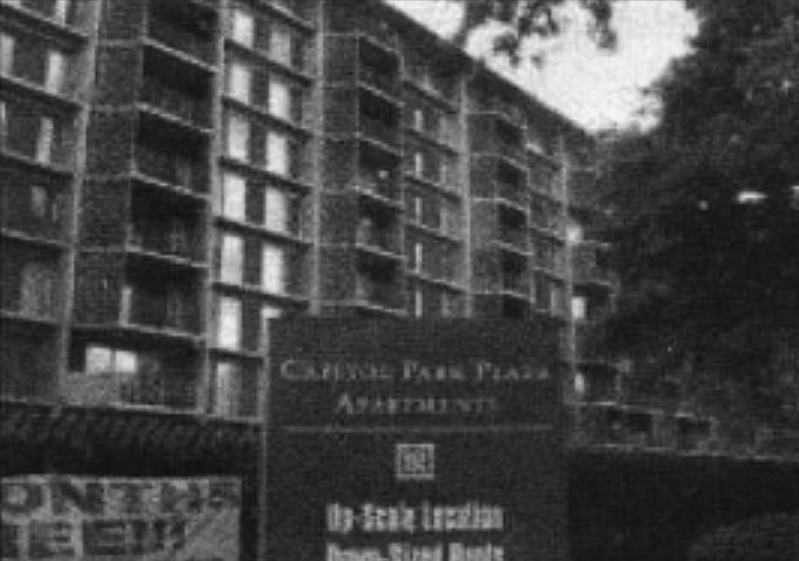After the D.C. Housing Finance Agency (HFA) and a private company bought two apartment complexes in Southwest in October 2002, Capitol Park Plaza and Capitol Park Twin Towers, the condition of the buildings quickly deteriorated while rent increased substantially.
Now a few former and current residents a suing HFA, arguing that the agency violated the tenants’ rights to decent housing and failed to provide a legally mandated tenant grievance system.
HFA was founded in 1979 to encourage homeownership in the District and expand rental ownership in the District and expand rental opportunities for residents. Among other activates, the agency provides tax-exempt bond financing for housing development or rehabilitation activities that increase the availability or quality of affordable housing. In the case of the Capitol Park apartments, said Capital Park Plaza resident Tom Seidman, HFA provided $30 million for the 2002 purchase and expected to convert 65 percent of the buildings’ units into government-subsidized housing.
Problems began nearly immediately, say residents. Residents didn’t learn for months that their buildings had been sold, said Seidman. And when the renovation contractors began entering the apartment complexes regularly in early 2003 to begin an extensive demolition and construction program, said Kevin Fitzgerald, a resident of Capitol Park Plaza since 2001 and treasurer of the building’s tenant association, “the buildings’ [doors] were left open by [contractors] 24/7 in a neighborhood where that is a bad thing.”
Tenants began reporting missing DVDs, food, and alcohol, as well as the smell of cigarettes, after contractors had worked in their apartments. Former Capital Park Twin owners resident Andrew Critchfield reported that a ceramic from his apartment went missing after contractors replaced his toilet. After called management to report the missing object, he was told that it was broken when the contractors arrived, so they cleaned it up and threw it away.
“Those kinds of things happened a lot… it was absolutely a horrible experience,” Critchfield said.
The tenants maintain that the renovation actually made the quality of life worse in the buildings. Seidman said that the new cabinets contractors installed were roughly 30 percent smaller than the ones they replaced. Air conditioning units were replaced with HVAC units that took up nearly 6 square feet.
The renovation was accompanied by pests of all kinds. One tenant complained that, between the rapidly expanding mouse and roach populations and the mold growth fostered by debris and decreased ventilation, she felt like she was living in a biology lab. The mold caused respiratory problems, and one tenant reported that her doctor found mold in her bloodstream. Residents also reported increases in thefts, break-ins, graffiti, prostitution, solicitation, and arson. In September and October 2003 alone there were seven arson incidents in the two buildings. “It was like a project to evict people,” Fitzgerald said.
When complaints to building managers went unanswered, tenants began filing petitions with the D.C. Department of Consumer and Regulatory Affairs (DCRA) and HFA – even though tenants said that apartment managers warned them against such activism, saying it would jeopardize the tenants’ in Section 8 benefits. But HFA simply handed the tenant complaints back to the non-responsive managers, said Critchfield.
When DCRA determined in December 2003 that HFA had jurisdiction over the tenants’ complaints, residents found that a failure of D.C. bureaucracy left them with virtually no leverage against the agency. Shortly after HFA was founded, the D.C. City Council held that while residents of HFA-financed buildings were not covered by the legal protections the Rental Housing Act provides tenants in private rental complexes, the agency was required to create a system for hearing and addressing tenant grievances. HFA, however, never complied with the council’s mandate. HFA, however, new complied with the council’s mandate. “It’s not even that there is one system of protections for HFA-project tenants and another for everyone else,” said the attorney for the tenants, Zachary Wolfe of the People’s Law Resource Center (PLRC). “There is no system of protection for HFA-project tenants.”
Residents believed they had no option but to seek legal redress. In December 2004, PLRC and the members of the Capitol Park Plaza Tenants’ Association filed suit against HFA in district court, alleging that HFA failed to complete its lawful charge to “establish, by rulemaking procedures for evictions and protections from retaliatory actions for tenants.”
“The case is going forward and we are in settlement discussions. HFA maintains that it is not obligated to institute formal proceedings to protect tenant rights,” Wolfe said.
When asked to comment, HFA attorney Andrew Terrel said that HFA will “be litigating [the case] in court and not in the newspapers” and that the agency hopes to litigate [the case] to everyone’s satisfaction.”
For Capitol Park residents, however, the harm has already been done. Fitzgerald says that the buildings are “nowhere near as safe and decent as before. It wasn’t the Ritz, but now [they’re] much more expensive and not as good.” It’s now a matter of principle. “The litigation that we bring is not necessarily for our benefit,” said Fitzgerald. “This is for people in the future.”








